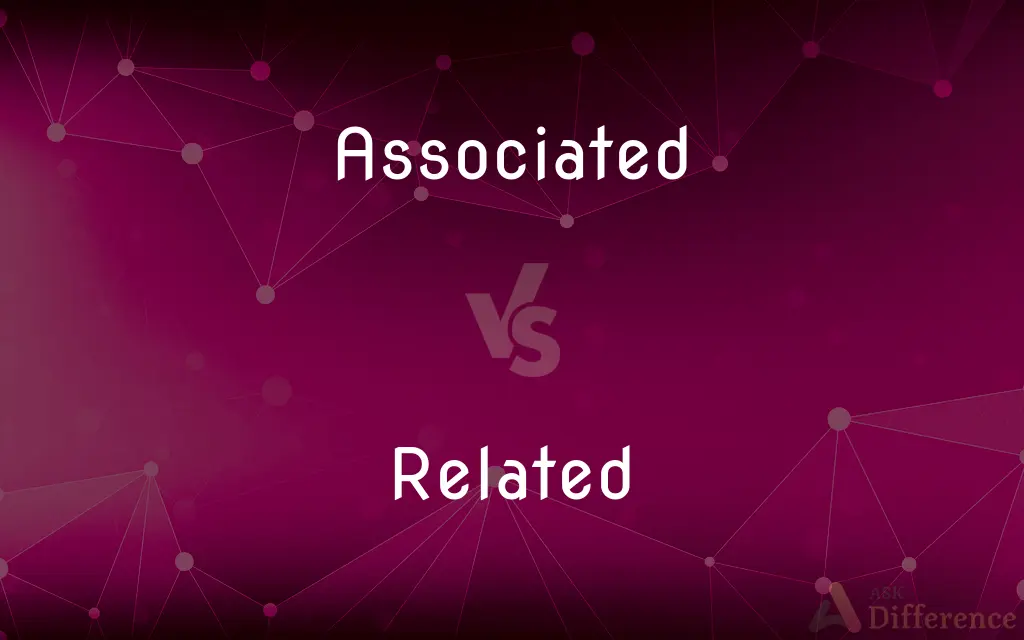Associated vs. Related — What's the Difference?
By Maham Liaqat & Urooj Arif — Updated on April 2, 2024
Associated terms are linked by circumstance or context, whereas related terms share a direct connection or relevance.

Difference Between Associated and Related
Table of Contents
ADVERTISEMENT
Key Differences
When we talk about things being associated, we imply a connection through context, activities, or shared attributes, but not necessarily a direct relationship. For instance, reading and libraries are associated because libraries provide a common venue for reading activities. On the other hand, related terms imply a direct connection or relevance, often suggesting a familial, logical, or natural linkage. Reading and writing are related because both are integral parts of literacy.
Associations can be more casual or situational, emerging from shared environments, joint events, or common interests. For example, coffee and conversation are often associated with each other as they frequently occur together in social settings. Relatedness, however, denotes a stronger or more inherent connection, such as thematic similarity or direct relevance to one another. Themes of love and heartbreak are related in literature because they directly impact and inform each other.
The concept of being associated often hinges on the idea of association by choice or circumstance rather than inherent qualities. For instance, sports and physical health are associated due to the common context of fitness, though one can pursue physical health through various means not involving sports. Relatedness speaks to a more intrinsic or essential connection, such as the relationship between nutrition and health, where one directly influences the other.
In business and professional settings, associated entities may collaborate or share a platform for mutual benefits without having a fundamental link. Companies in a business association share common goals or face similar challenges, but their core functions may not be related. Conversely, related entities in business, such as subsidiary companies, share a direct organizational or operational connection.
Understanding the distinction between associated and related helps clarify the nature of connections among concepts, objects, or entities. This distinction is crucial for accurate communication, especially in academic, professional, and scientific contexts, where the specificity of relationships can significantly impact interpretation and understanding.
ADVERTISEMENT
Comparison Chart
Nature of Connection
Connection through context or circumstance.
Direct or inherent connection.
Strength of Link
Can be casual or situational.
Implies a stronger, more intrinsic link.
Examples
Coffee and conversation; sports and teamwork.
Reading and writing; nutrition and health.
Professional Context
Companies in a business association.
Subsidiary companies within a corporation.
Implication
Implies a link by choice or shared attributes.
Suggests an essential or logical linkage.
Compare with Definitions
Associated
Connected through context or shared activities.
Sunscreen is often associated with beach outings.
Related
Implying a logical or inherent connection.
Economic policies are closely related to unemployment rates.
Associated
Linked by a common attribute or situation.
Celebration is closely associated with festive music.
Related
Sharing a direct or familial connection.
Classical music is closely related to opera in terms of historical development.
Associated
Implying a connection based on association rather than direct relevance.
Fitness trackers are increasingly associated with health-conscious lifestyles.
Related
Having a direct relevance or link.
Nutritional intake is directly related to physical health.
Associated
Relating to the idea of being connected in people’s minds due to common occurrence.
Coffee is often associated with energy and alertness.
Related
Involving a direct correspondence or parallel.
The concepts of supply and demand are related in economic theory.
Associated
Involving a partnership or collaboration without a direct link.
The charity event was associated with several local businesses for sponsorship.
Related
Denoting a connection by nature or essence.
Stress is related to several health issues, including heart disease.
Associated
To connect in the mind or imagination
"I always somehow associate Chatterton with autumn" (John Keats).
Related
Related is an American comedy-drama television series that aired on The WB from October 5, 2005, to March 20, 2006. It revolves around the lives of four close-knit sisters of Italian descent, raised in Brooklyn and living in Manhattan.
Associated
To connect or involve with a cause, group, or partner
Wasn't she associated with the surrealists?.
Related
Being connected; associated.
Associated
To correlate or connect logically or causally
Asthma is associated with air pollution.
Related
Connected by kinship, common origin, or marriage.
Associated
To join in or form a league, union, or association
The workers associated in a union.
Related
(Music) Having a close harmonic connection.
Associated
To spend time socially; keep company
Associates with her coworkers on weekends.
Related
Standing in relation or connection.
Electric and magnetic forces are closely related.
On a related note
Associated
A person united with another or others in an act, enterprise, or business; a partner or colleague.
Related
Being a relative of.
Everyone is related to their parents.
Associated
An employee, especially one in a subordinate position,
Related
Narrated; told.
Associated
A companion; a comrade.
Related
Synonym of relative.
Associated
One that habitually accompanies or is associated with another; an attendant circumstance.
Related
(mathematics) Fulfilling a relation.
Associated
A member of an institution or society who is granted only partial status or privileges.
Related
Having a relationship with the thing named
Gun-related crime.
Associated
Joined with another or others and having equal or nearly equal status
An associate editor.
Related
Simple past tense and past participle of relate
Associated
Having partial status or privileges
An associate member of the club.
Related
Allied by kindred; connected by blood or alliance, particularly by consanguinity; as, persons related in the first or second degree.
Associated
Following or accompanying; concomitant.
Related
Standing in relation or connection; as, the electric and magnetic forcec are closely related.
Associated
Connected with something or another person.
An associated member
The associated risks
Related
Narrated; told.
Associated
Connected or amalgamated with another company.
Related
Same as Relative, 4.
Associated
Simple past tense and past participle of associate
Related
Being connected or associated;
Painting and the related arts
School-related activities
Related to micelle formation is the...ability of detergent actives to congregate at oil-water interfaces
Associated
Joined as a companion; brought into association; accompanying; combined.
Related
Connected by kinship, common origin, or marriage
Associated
Related to or accompanying;
Christmas and associated festivities
Related
Similar or related in quality or character;
A feeling akin to terror
Kindred souls
The amateur is closely related to the collector
Associated
Joined in some kind of relationship (as a colleague or ally or companion etc.);
A cabal of associated lawyers
Related
Having close kinship and appropriateness;
He asks questions that are germane and central to the issue
Common Curiosities
Can a concept be both associated and related to another?
Yes, in certain contexts, concepts can be both associated and related, especially if they share both situational connections and direct relevancies.
What does it mean for two things to be associated?
Two things are associated when they are linked by context, situation, or shared attributes, but not directly connected.
Why is the distinction between associated and related important?
Understanding this distinction is crucial for clarity in communication, especially in academic and professional contexts where precision in the nature of connections matters.
How do associations differ from relationships?
Associations are more about connections formed through circumstances or shared activities, whereas relationships often imply a closer, direct linkage.
How does the idea of being associated apply in social contexts?
In social contexts, being associated often refers to shared interests or activities among individuals or groups.
What makes two concepts related in a scientific sense?
In science, two concepts are related if they have a direct cause-and-effect relationship or if one can be used to predict or explain the other.
How do associations form between concepts or entities?
Associations form through repeated exposure, common occurrences, or shared contexts that link concepts or entities in people's minds.
Can businesses be both associated and related?
Businesses can be both associated (through partnerships or alliances) and related (through direct ownership or operational ties).
What impact does association have on perception?
Association can significantly impact perception by linking ideas or products in people's minds, influencing attitudes and behaviors.
What role do related concepts play in learning and memory?
Related concepts help in learning and memory by creating logical or inherent connections that facilitate understanding and recall.
How do marketers use the concept of association?
Marketers use association to link products with positive feelings, situations, or desirable attributes to influence consumer behavior.
What defines related terms?
Related terms share a direct, inherent, or logical connection, often implying a familial or essential relevance.
How does the distinction affect legal or contractual relationships?
In legal or contractual contexts, this distinction affects obligations and expectations, as related parties may have direct duties, while associated entities might share interests without formal responsibilities.
What examples illustrate the difference between being associated and related?
Coffee and mornings are associated due to common use, whereas caffeine and alertness are related due to a direct effect.
Is the relationship between cause and effect considered associated or related?
The relationship between cause and effect is considered related because it involves a direct, causal connection.
Share Your Discovery

Previous Comparison
Required vs. Requested
Next Comparison
Bermudian vs. BermudanAuthor Spotlight
Written by
Maham LiaqatCo-written by
Urooj ArifUrooj is a skilled content writer at Ask Difference, known for her exceptional ability to simplify complex topics into engaging and informative content. With a passion for research and a flair for clear, concise writing, she consistently delivers articles that resonate with our diverse audience.
















































